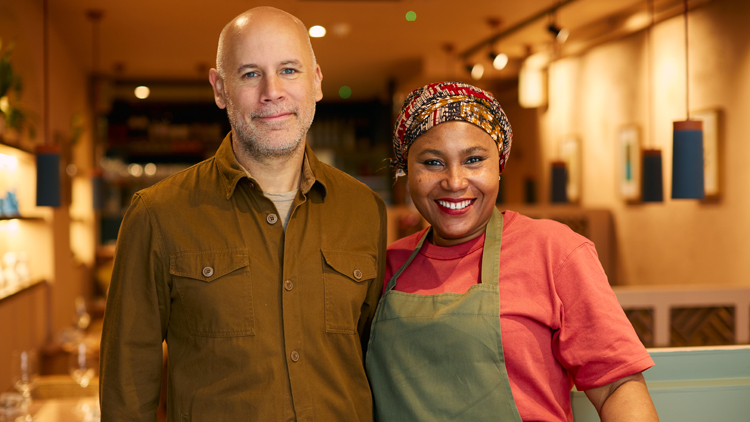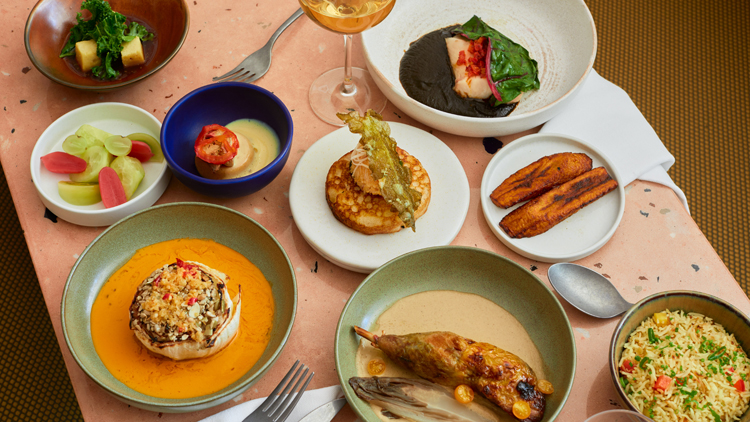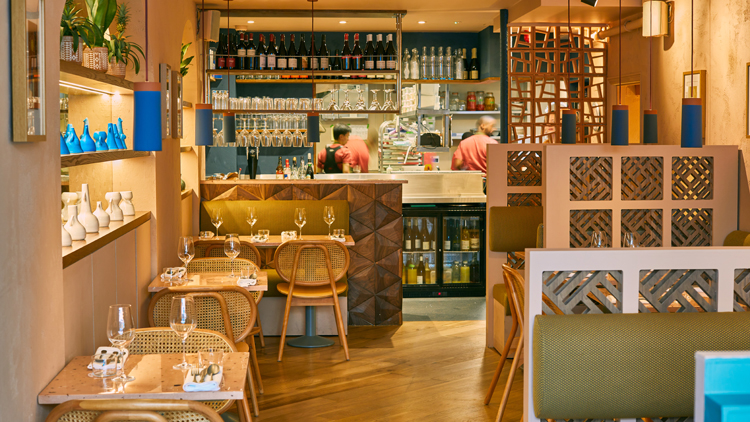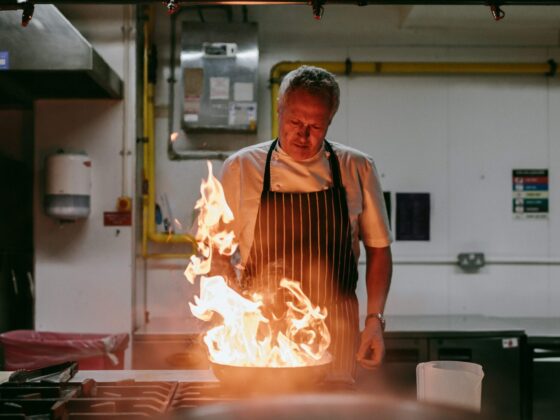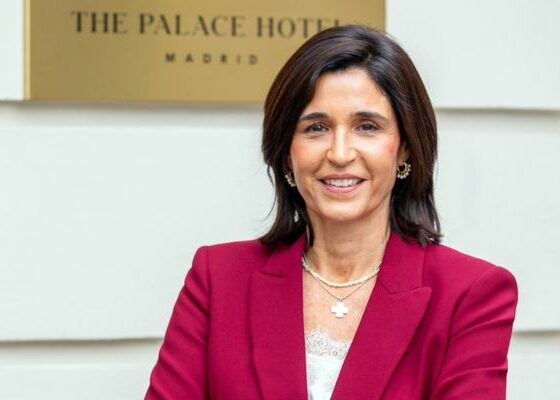It’s another busy week for Adejoké ‘Joké’ Bakare. The chef behind award-winning West African restaurant Chishuru in central London emerges from the kitchen following a bustling lunch service. Dinner is set to be fully booked too, as is much of the rest of the week. In the five or so months since the restaurant received a star in the Michelin Guide Great Britain & Ireland 2024, it seems things have barely stopped.
Indeed, as well as Restaurant, Joké is set to do an interview with The New York Times on the week we meet. This follows recent feature pieces on CBS and NBC in the US; an interview with German publication Der Spiegel; and appearances on both the BBC World at One and The Food Programme.
“It’s bonkers,” says Joké, with something of a bemused smile, as we chat about her various media engagements.
Michelin isn’t the only accolade Joké has picked up in recent months, either. Just last month she was named Chef of the Year at the National Restaurant Awards, with Chishuru ranking at number 31 on the list of the UK’s Top 100 Restaurants. And earlier in the year she was also named Woman of the Year by Code Hospitality.
“It’s very moving,” she continues. “Respectable people, who have been doing things a lot longer than I have, rate me. It’s amazing. I’m speechless.”
A meteoric rise
It’s a meteoric rise for Joké, who just four years ago was preparing to launch her well-regarded supper club Chishuru as a restaurant in Brixton Village after winning the amateur category in the Brixton Kitchen competition the year before. Restaurant visited Joké just two weeks after she opened in Brixton, in September 2020 amid the murmurings of a second Coronavirus lockdown. At the time she described the opening as being ‘a major step’ towards fulfilling her dream of introducing her vision of West African cuisine to the London food scene.
Much, of course, has changed since then, including the restaurant’s location, which moved from Brixton to Great Titchfield Street in Fitzrovia in September last year. “We’d outgrown the Brixton space,” explains Matt Paice, Joké’s business partner. “We were named Time Out’s best restaurant of 2022, and expectations were growing higher and higher as we got busier and busier. We had 32 covers, operating seven services a week, and one week we took £14,000 net.
“Respectable people, who have been doing things a lot longer
than I have, rate me. It’s amazing. I’m speechless”
“We knew we had to move, and we knew we had to be central as we were getting more international customers.”
The restaurant itself may have relocated, but Joké’s focus remains on delivering her own personal interpretation of West African cuisine. “Brixton was about sharing the food of my region, and I process the move as just being a bigger place to share the food,” she says. “More people are able to come, and the environment is more welcoming.”
Chishuru 3.0
Chishuru was one of two West African restaurants in central London to win a star this year – Aji Akokomi’s Akoko, also in Fitzrovia, being the other – but its success is arguably more defining, with Joké becoming the first black female chef in the UK to win a star and only the second ever in the world. The significance of the moment clearly wasn’t lost on Michelin, which purposely held back the announcement at its awards ceremony until all the other new one-star restaurants had been confirmed.
Joké could barely muster more than a couple of words when she took to the stage to receive the Michelin jacket and remains reluctant to talk about it in much detail. “I don’t think about it, and I don’t dwell on it,” she says. “I’m so focused on the food and how people interact with it.
“What I see is pride that more people have heard of us and because of that I want to be true to what the cuisine is. I can’t start pretending to be something I’m not.”
The impact of the accolade on the restaurant itself was instantaneous. “It’s hard to properly quantify as we were still a new restaurant and on an upward trajectory, but we’ve seen around a 60% increase in trade,” says Paice. “It’s crazy. We’ve had gifts of champagne sent from some of the biggest restaurants in the world, including Mirazur (Mauro Colagreco’s famed three-star restaurant in Menton, France), and The Clove Club (Isaac McHale’s two star in London’s Shoreditch).
“It feels in some ways that things are calming down now, and yet we did our best ever day just a couple of weeks back.”
As well as a boost in dining numbers, the star has also led to a further evolution of the restaurant itself. “We’re now really at Chishuru 3.0,” continues Paice. “There was Brixton; and then when we first opened in Fitzrovia; and now, post Michelin star.”
One of the key changes is the size and experience of the kitchen team. Back in Brixton the kitchen was manned by just Joké and a single chef de partie; now the Chishuru kitchen has an eight-strong brigade, many of whom joined having previously worked at other restaurants with Michelin stars. “When you’re operating with that level of firepower there’s so much more detail you can put into the food,” Paice notes. “Be it a blob of sauce or dressing or ferment, which lifts a dish from being enjoyable to sophisticated.”
“I’m so focused on the food and how people interact with it”
This also feeds into the structure and the price of the menu. When Chishuru won its star, its set menu at dinner cost £75, which made it one of the least expensive Michelin restaurants in the country. The decision was soon made to raise the price to £95 and introduce a few extra elements to the menu including a welcome snack, petit fours, and an ‘extra treat’ with the bill.
“Being the second cheapest Michelin star restaurant in the country is not somewhere we wanted to be in from a business point of view,” Paice adds. “We’re not a fine dining restaurant. We’re never going to do a caviar supplement. So, there is a cap on what we can charge. Adding in those extra touches, like the welcome snack and petit fours, is what Chishuru 3.0 is about.”
Meeting expectations
Chishuru 3.0 is ultimately reflective of the greater expectations placed on the restaurant now that it has a star. “It’s a regular challenge,” says Paice. “Food wise, people are coming in with a decent idea of what they’re going to get. The bigger problem we have is because of the Michelin star they assume tables will be spaced, waiters in suits, cloches and all that nonsense. All that stuff from the days when Michelin stars and fine dining trappings went together all the time – but they don’t anymore.”
Despite the odd customer grumble, Chishuru remains a firm hit with diners. The restaurant holds a 4.6 out of 5 rating on Google reviews and remains a favourite with critics, with the FT’s Tim Hayward earlier this year describing it as ‘utterly brilliant’.
The restaurant’s regularly-changing menu is a clear embodiment of Joké’s warmth and generosity, both as a person and a chef. “When I first started in Brixton, I was discovering who I was as a chef,” she says. “I was more concerned about how it looked and that it was accessible to those without connection to the food.”
So, what’s changed in those four years? “Now I’m much more mindful about how I put the food down and explain it, so that diners with no experience of West African cuisine can come and confidently say they’ve tasted it, even if it looks different,” she continues. “And as well as being passionate about sharing my heritage, my food is coloured by my experiences. I’ve been in London for over 25 years and obviously that shows in how I cook.
“It’s about being more real to me, especially when it comes to flavour.”
The cooking at Chishuru is as homely and unpretentious as it is inventive and interesting, with dishes on the menu at the time of writing including mushroom moi, bean cake with porcini, maitake and trompette mushrooms, and scotch bonnet sauce; gizdodo, slow-cooked ox tongue with caramelised plantain, red pepper and anchovy dressing; and yassa – charcoal-grilled guineafowl breast with caramelised onion and lemon sauce, and yaji peanut spice.
“When people come here, they’re eating food they haven’t had before,” says Paice. “There’s a uniqueness to the experience and the food. Joké is the only person in the UK doing what she’s doing. She’s taking little points of inspiration and ingredients and trying to pull something new and something personal out of them.”
A more regional focus
While many people still want to talk to Joké, of course, about her Michelin success, her focus now is on continuing to develop the menu. This includes working on setting up more robust supply lines with producers of West African cuisine (a constant struggle that Chishuru has faced) and taking the opportunity to take more time to explore the different cuisines of West Africa.
When we meet, Joké and Paice have recently returned from a research trip to Lagos in Nigeria that they went on with Chishuru’s recently-appointed new head chef Christine Walsh. It was an opportunity to begin working on the next evolutionary stage of restaurant’s food offering.
“I want to be more regional,” says Joké of her plans for the menu. “I’m doing a bit of that already and going forwards I want to codify what it is we do and be able to tell an authentic story while remaining unashamedly ourselves.”
